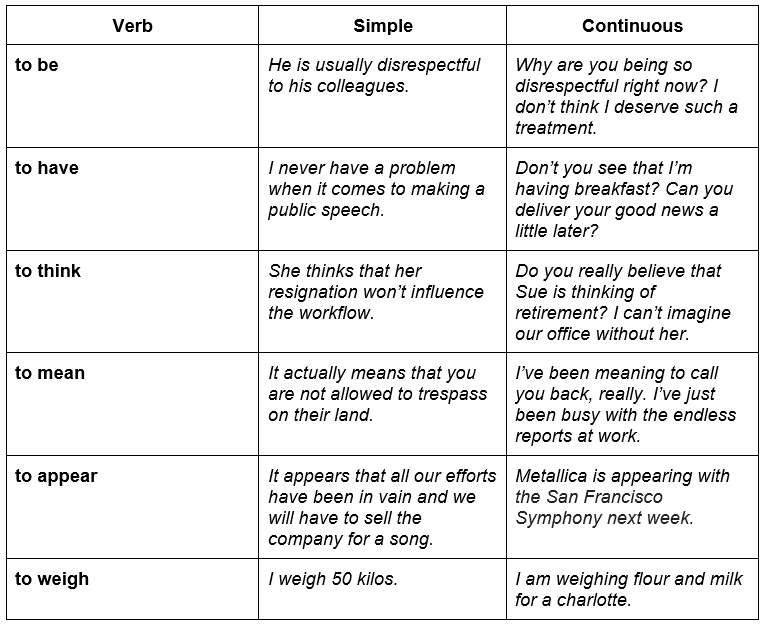There are certain verbs that we rarely use in continuous tenses. They usually describe the state of being, feelings, emotions, and mental processes.
existence: to be, to contain, to exist
Both managers and the CEO are at fault.
These biscuits contain raisins. You know I hate them.
This project wouldn’t exist if it hadn’t been for John.
possession: to belong, to have (to own), to include, to possess
I think these papers belong to my study.
At least he had the decency to tell it to my face.
Your new position will include a personal driver and free lunches at the restaurant in the lobby.
feelings: to despise, to adore, to admire, to love, to hate, to detest, to envy, to pity, to wish
I detest any kind of cruelty towards animals.
I sincerely admire your ability to abstract yourself from the rest of the staff.
He has always envied his brother’s luck.
thinking: to believe, to doubt, to expect, to forget, to imagine, to intend, to know, to comprehend, to realize, to recognise, to want, to see (to understand), to suppose, to understand
She might call you back later but I very much doubt that.
I spent more money on renovating the house than I had originally intended.
appearance: to appear, to resemble, to seem
You need to appear reserved and calm at the job interview even if you are in a state of sheer panic.
My neighbor resembles Leo DiCaprio at the times when he acted in Shutter Island.
She seems rather devastated every time she starts talking to her husband on the phone.
other examples: to concern, to cost, to depend, to deserve, to fit, to matter, to mean, to mind, to weight
The only thing that matters is that all your loved ones are safe and sound.
I don’t mind going to bed straight away. I’m awfully tired.
The poor state of his health concerns me deeply.
Some of these verbs can be used in both in a simple and continuous tense with the change in meaning:

The verbs that describe senses aren’t usually used in a continuous tense: to hear, to smell, to taste, to see.
I never hear when someone knocks on the door.
It smells of baked meat. Are you cooking anything?
Mmm, yummy. I like how this sauce tastes. Can you give me the list of ingredients?
- Can you read the subtitles without your glasses?
- Are you kidding? I can’t even see your face clearly without them.
We can use the verbs “to smell” and “to taste” in a continuous tense when we need to describe a deliberate action:
- What are you doing?
- I’m smelling the soup. I think it’s too salty.
- Has anyone seen Kate?
- She’s probably in the kitchen, tasting your creme cake.
The verb “to see” is used in a continuous form meaning “to meet, to visit, to date someone”:
She is seeing her therapist next week.
He has been seeing Jane for 2 years already. I think he’s going to propose soon.
Some verbs of feeling can be used in both simple and continuous tenses without any change in meaning: to hurt, to feel.
I think my head is going to blow up. It hurts/ is hurting so much.
I can’t say that I feel/ am feeling particularly happy. Contented might be a better word.
Performative verbs describe an action when they are used in the first person and the present tense, and they address the listener directly.
These are the verbs: to accept, to agree, to apologize, to declare, to deny, to disagree, to forbid, to forgive, to guarantee, to insist, to invite, to order, to postpone, to promise, to predict, to recommend, to refuse, to suggest, to thank, to warn.
I sincerely apologize for all the inconveniences you are experiencing due to logistics challenges.
Sony denies any disruptions in monthly subscription payments.
We guarantee that we will meet all the deadlines stated in the contract.
We strongly recommend that all our users upgrade the software on a regular basis to avoid any failures in operation.